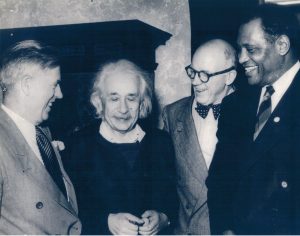Paul Robeson
Paul Robeson (April 9, 1898 – January 23, 1976) was an American bass-baritone singer, actor, orator, and political activist. He became famous both for his cultural accomplishments and for his political activism. Born in Princeton, New Jersey, Robeson was the son of an escaped slave and became a notable figure in the Harlem Renaissance, with his performance in the Broadway production of The Emperor Jones and his rendition of "Ol' Man River" in the musical Show Boat being particularly celebrated. Despite his success, Robeson's career was deeply affected by the McCarthy era and his outspoken criticism of the United States government, particularly regarding its racial policies and its stance towards the Soviet Union.
Early Life[edit | edit source]
Paul Robeson was born to Maria Louisa Bustill and William Drew Robeson. His father was an escaped slave who became a Presbyterian minister, while his mother came from a distinguished Quaker family of mixed ancestry. The young Robeson excelled academically and athletically in high school and went on to attend Rutgers University, where he was a standout student and athlete. He was only the third African-American student to be admitted to Rutgers, where he earned varsity letters in multiple sports and was valedictorian of his class.
Career[edit | edit source]
After graduating from Rutgers, Robeson went on to attend Columbia Law School. However, he turned to acting and singing professionally after encountering racism in the legal profession. His performance in The Emperor Jones in 1924 made him a star, and he continued to break new ground for African-American actors, refusing to accept roles that stereotyped black people. His singing career was equally distinguished, with his powerful bass-baritone voice making him a popular concert artist worldwide.
Political Activism[edit | edit source]
Robeson's political views were shaped by his experiences of racism and his belief in international solidarity among oppressed peoples. He became an outspoken critic of colonialism and a supporter of the Soviet Union, seeing it as a bulwark against fascism and racism. His political activities, including his opposition to the Spanish Civil War and his advocacy for civil rights, led to him being blacklisted during the McCarthy era. His passport was revoked for eight years, severely limiting his ability to travel and perform internationally.
Legacy[edit | edit source]
Despite the controversies surrounding his political views, Robeson's contributions to music, theatre, and civil rights have been widely recognized. He was a pioneer for African-Americans in the performing arts and used his fame to fight for equality and justice. After his death in 1976, Robeson's legacy has been honored with numerous awards and recognitions, including his induction into the College Football Hall of Fame and the posthumous awarding of the Grammy Lifetime Achievement Award.
Selected Works[edit | edit source]
- The Emperor Jones (1924)
- Show Boat (1927)
- Othello (1943)
See Also[edit | edit source]
This article is a African American–related stub. You can help WikiMD by expanding it!
Search WikiMD
Ad.Tired of being Overweight? Try W8MD's physician weight loss program.
Semaglutide (Ozempic / Wegovy and Tirzepatide (Mounjaro / Zepbound) available.
Advertise on WikiMD
|
WikiMD's Wellness Encyclopedia |
| Let Food Be Thy Medicine Medicine Thy Food - Hippocrates |
Translate this page: - East Asian
中文,
日本,
한국어,
South Asian
हिन्दी,
தமிழ்,
తెలుగు,
Urdu,
ಕನ್ನಡ,
Southeast Asian
Indonesian,
Vietnamese,
Thai,
မြန်မာဘာသာ,
বাংলা
European
español,
Deutsch,
français,
Greek,
português do Brasil,
polski,
română,
русский,
Nederlands,
norsk,
svenska,
suomi,
Italian
Middle Eastern & African
عربى,
Turkish,
Persian,
Hebrew,
Afrikaans,
isiZulu,
Kiswahili,
Other
Bulgarian,
Hungarian,
Czech,
Swedish,
മലയാളം,
मराठी,
ਪੰਜਾਬੀ,
ગુજરાતી,
Portuguese,
Ukrainian
Medical Disclaimer: WikiMD is not a substitute for professional medical advice. The information on WikiMD is provided as an information resource only, may be incorrect, outdated or misleading, and is not to be used or relied on for any diagnostic or treatment purposes. Please consult your health care provider before making any healthcare decisions or for guidance about a specific medical condition. WikiMD expressly disclaims responsibility, and shall have no liability, for any damages, loss, injury, or liability whatsoever suffered as a result of your reliance on the information contained in this site. By visiting this site you agree to the foregoing terms and conditions, which may from time to time be changed or supplemented by WikiMD. If you do not agree to the foregoing terms and conditions, you should not enter or use this site. See full disclaimer.
Credits:Most images are courtesy of Wikimedia commons, and templates, categories Wikipedia, licensed under CC BY SA or similar.
Contributors: Prab R. Tumpati, MD






